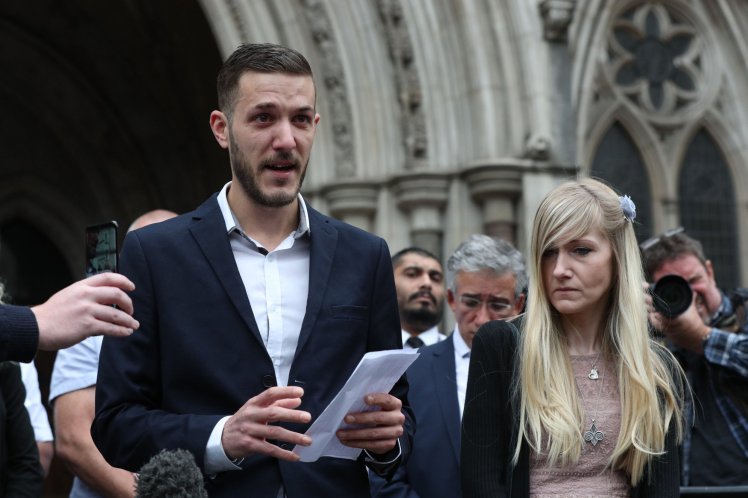 Parents of Charlie Gard, the terminally ill British baby have dropped their legal battle seeking to give the child further treatment.
Parents of Charlie Gard, the terminally ill British baby have dropped their legal battle seeking to give the child further treatment.
They will now hold discussions with his London hospital about how he should be allowed to die.
Charlie’s mother, Connie Yates, who won the support of U.S. President Donald Trump and Pope Francis with a campaign to keep him alive, said 11-month-old Charlie could have lived a normal life if he had been given treatment earlier.
Charlie has a rare genetic condition causing progressive muscle weakness and brain damage.
His parents had sought to send him to the United States to undergo experimental therapy.
Britain’s courts, backed by the European Court of Human Rights, refused permission, saying it would prolong his suffering without any realistic prospect of helping the child.
 Parents of Charlie Gard, the terminally ill British baby have dropped their legal battle seeking to give the child further treatment.
Parents of Charlie Gard, the terminally ill British baby have dropped their legal battle seeking to give the child further treatment.
They will now hold discussions with his London hospital about how he should be allowed to die.
Charlie’s mother, Connie Yates, who won the support of U.S. President Donald Trump and Pope Francis with a campaign to keep him alive, said 11-month-old Charlie could have lived a normal life if he had been given treatment earlier.
Charlie has a rare genetic condition causing progressive muscle weakness and brain damage.
His parents had sought to send him to the United States to undergo experimental therapy.
Britain’s courts, backed by the European Court of Human Rights, refused permission, saying it would prolong his suffering without any realistic prospect of helping the child.
 Parents of Charlie Gard, the terminally ill British baby have dropped their legal battle seeking to give the child further treatment.
Parents of Charlie Gard, the terminally ill British baby have dropped their legal battle seeking to give the child further treatment.
They will now hold discussions with his London hospital about how he should be allowed to die.
Charlie’s mother, Connie Yates, who won the support of U.S. President Donald Trump and Pope Francis with a campaign to keep him alive, said 11-month-old Charlie could have lived a normal life if he had been given treatment earlier.
Charlie has a rare genetic condition causing progressive muscle weakness and brain damage.
His parents had sought to send him to the United States to undergo experimental therapy.
Britain’s courts, backed by the European Court of Human Rights, refused permission, saying it would prolong his suffering without any realistic prospect of helping the child.
 Parents of Charlie Gard, the terminally ill British baby have dropped their legal battle seeking to give the child further treatment.
Parents of Charlie Gard, the terminally ill British baby have dropped their legal battle seeking to give the child further treatment.
They will now hold discussions with his London hospital about how he should be allowed to die.
Charlie’s mother, Connie Yates, who won the support of U.S. President Donald Trump and Pope Francis with a campaign to keep him alive, said 11-month-old Charlie could have lived a normal life if he had been given treatment earlier.
Charlie has a rare genetic condition causing progressive muscle weakness and brain damage.
His parents had sought to send him to the United States to undergo experimental therapy.
Britain’s courts, backed by the European Court of Human Rights, refused permission, saying it would prolong his suffering without any realistic prospect of helping the child.
 Parents of Charlie Gard, the terminally ill British baby have dropped their legal battle seeking to give the child further treatment.
Parents of Charlie Gard, the terminally ill British baby have dropped their legal battle seeking to give the child further treatment.
They will now hold discussions with his London hospital about how he should be allowed to die.
Charlie’s mother, Connie Yates, who won the support of U.S. President Donald Trump and Pope Francis with a campaign to keep him alive, said 11-month-old Charlie could have lived a normal life if he had been given treatment earlier.
Charlie has a rare genetic condition causing progressive muscle weakness and brain damage.
His parents had sought to send him to the United States to undergo experimental therapy.
Britain’s courts, backed by the European Court of Human Rights, refused permission, saying it would prolong his suffering without any realistic prospect of helping the child.
 Parents of Charlie Gard, the terminally ill British baby have dropped their legal battle seeking to give the child further treatment.
Parents of Charlie Gard, the terminally ill British baby have dropped their legal battle seeking to give the child further treatment.
They will now hold discussions with his London hospital about how he should be allowed to die.
Charlie’s mother, Connie Yates, who won the support of U.S. President Donald Trump and Pope Francis with a campaign to keep him alive, said 11-month-old Charlie could have lived a normal life if he had been given treatment earlier.
Charlie has a rare genetic condition causing progressive muscle weakness and brain damage.
His parents had sought to send him to the United States to undergo experimental therapy.
Britain’s courts, backed by the European Court of Human Rights, refused permission, saying it would prolong his suffering without any realistic prospect of helping the child.
 Parents of Charlie Gard, the terminally ill British baby have dropped their legal battle seeking to give the child further treatment.
Parents of Charlie Gard, the terminally ill British baby have dropped their legal battle seeking to give the child further treatment.
They will now hold discussions with his London hospital about how he should be allowed to die.
Charlie’s mother, Connie Yates, who won the support of U.S. President Donald Trump and Pope Francis with a campaign to keep him alive, said 11-month-old Charlie could have lived a normal life if he had been given treatment earlier.
Charlie has a rare genetic condition causing progressive muscle weakness and brain damage.
His parents had sought to send him to the United States to undergo experimental therapy.
Britain’s courts, backed by the European Court of Human Rights, refused permission, saying it would prolong his suffering without any realistic prospect of helping the child.
 Parents of Charlie Gard, the terminally ill British baby have dropped their legal battle seeking to give the child further treatment.
Parents of Charlie Gard, the terminally ill British baby have dropped their legal battle seeking to give the child further treatment.
They will now hold discussions with his London hospital about how he should be allowed to die.
Charlie’s mother, Connie Yates, who won the support of U.S. President Donald Trump and Pope Francis with a campaign to keep him alive, said 11-month-old Charlie could have lived a normal life if he had been given treatment earlier.
Charlie has a rare genetic condition causing progressive muscle weakness and brain damage.
His parents had sought to send him to the United States to undergo experimental therapy.
Britain’s courts, backed by the European Court of Human Rights, refused permission, saying it would prolong his suffering without any realistic prospect of helping the child.














